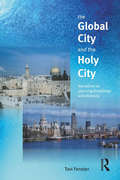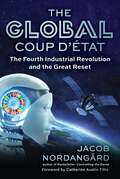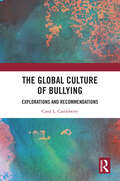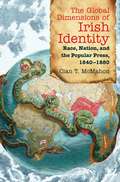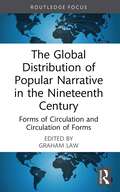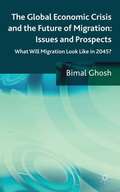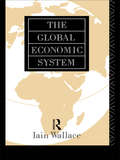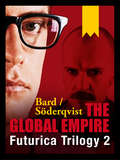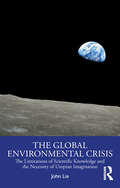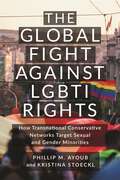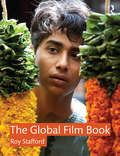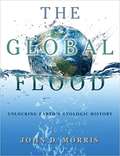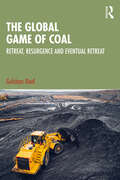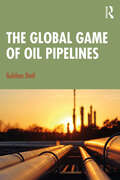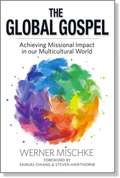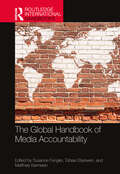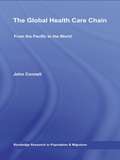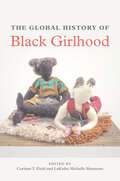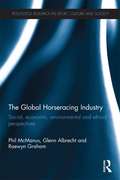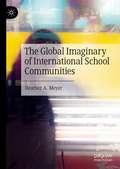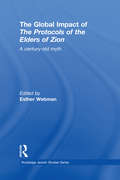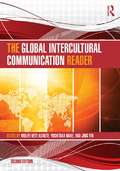- Table View
- List View
The Global City and the Holy City: Narratives on Knowledge, Planning and Diversity
by Tovi FensterThe Global City & the Holy City explores the local embodied knowledge of women and men of different national, cultural and ethnic identities and age groups, living in London and Jerusalem. Their narratives focus on the three main concepts of Comfort, Belonging and Commitment to the various spaces in which they live. By deconstructing the meanings of these three notions and analyzing their expression in cognitive temporal maps, The Global City & The Holy City examines the practicalities of incorporating this kind of local embodied knowledge into the professional planning and management of cities in the age of globalization.
The Global Coal Market
by Mark C. Thurber Thurber, Mark C. and Morse, Richard K. Richard K. MorseCoal has been the world's fastest-growing energy source in absolute terms for over a decade. Coal also emits more CO2 than any other fossil fuel and contributes to serious air pollution problems in many regions of the world. If we hope to satisfy the demand for affordable energy in emerging economies while protecting the environment, we need to develop a keen understanding of the market that supplies coal. This book offers an in-depth analysis of the key producers and consumers that will most influence coal production, transport, and use in the future. By exploring how countries such as China, India, Indonesia, Australia and South Africa have developed their respective coal industries - and how these industries link together through the international coal trade - experts shed light on how the global coal market may evolve, and the economic and environmental implications. This book is the most comprehensive treatment of these topics to date and will appeal to a wide readership, including scholars and practitioners working on energy economics and policy.
The Global Coup d'État: The Fourth Industrial Revolution and the Great Reset
by Jacob NordangårdWe are in the midst of a devastating takeover of our world. The Global Coup d'État shows how, why, and what we can do to stop it. The year 2020 will go down in history as the year when the global coup d'état was initiated. In a historical context, the COVID-19 crisis, the murder of George Floyd by a police officer and subsequent riots, mass protests against government lockdowns, and the 2020 election appear rather as part of a well-directed chess game, with complete control of the whole planet as the final goal. During the crescendo of this drama, the powers behind the coup emerged quite openly, offering a techno–totalitarian and very far-reaching solution to the world. This solution, which they call the Great Reset, means that mankind must be fully integrated and merged with a worldwide technological system, through the application of the technologies of the Fourth Industrial Revolution—all for our own safety, security, and well-being. Most people probably associate the phrase &“coup d'état&” with a sudden, violent takeover, with tanks around government buildings, takeover of media channels, purges of dissidents, arrests, and so on. But this is not always the case. The usurpers can also seize power without violence, in a completely legal and democratic way, with the consent or even enthusiasm of the people, as evidenced in 2020. There are many &“existential threats&” (climate crisis, refugee crises, terrorism, pandemics, etc.) that can be used to establish a firmer and more centralized governance. This can be a gradual process, barely perceivable until it&’s almost a fait accompli. In The Global Coup d'État, author and researcher Jacob Nordangård shares the history, describes the process, reveals the methods, and identifies the agents of this worldwide takeover so that we can take action before it is too late.
The Global Crisis and Transformative Social Change
by Shahra Razavi Peter Utting Rebecca Varghese BuchholzGlobal crises not only deeply impact the economy and people's livelihoods, they also unsettle basic ideas and assumptions about the meaning and drivers of development. This collection of theoretical and empirical studies explores the substance and politics of policy change following the 2007/8 crisis from the perspective of developing countries.
The Global Culture of Bullying: Explorations and Recommendations
by Carol CastleberryThis book explicates “bullying” as a concept and as a social and cultural phenomenon that has become a defining reality of the times in which we live. The author begins in the arena where it is first, and most acutely individually, experienced—in school—and expands to other institutions and areas of social life—the family, the workplace, and the local, national, and international spheres, extending the concept of bullying to the global arena to uncover the social and institutional root causes of the extreme forms of bullying such as trafficking, torture, terrorism, and genocide. The book discusses the steps taken to address these issues and analyzes their efficacy. It explores the concept of epigenetics, brain development, childhood experiences, and other psychological factors that contribute to bullying behaviors and predispositions. The book investigates and compares anti-bullying and anti-violence initiatives taken particularly in the U.S, the U.K., and India to address the issue and create community-wide resilience practices. It also describes the current trends in decisions from international, regional, and domestic law, and offers evidence-based policy recommendations to establish a culture of respect for human dignity. An interdisciplinary, intercultural exploration, and analysis of the phenomenon of bullying, this book will be of interest to students, teachers, and researchers of psychology, sociology, anthropology, social justice and law, human rights, and cultural studies. It will also be useful for academic libraries, academicians, policy planners, school administration, government officials, and readers interested in reading about bullying.
The Global Dimensions of Irish Identity
by Cian T. McmahonThough Ireland is a relatively small island on the northeastern fringe of the Atlantic, 70 million people worldwide--including some 45 million in the United States--claim it as their ancestral home. In this wide-ranging, ambitious book, Cian T. McMahon explores the nineteenth-century roots of this transnational identity. Between 1840 and 1880, 4.5 million people left Ireland to start new lives abroad. Using primary sources from Ireland, Australia, and the United States, McMahon demonstrates how this exodus shaped a distinctive sense of nationalism. By doggedly remaining loyal to both their old and new homes, he argues, the Irish helped broaden the modern parameters of citizenship and identity.From insurrection in Ireland to exile in Australia to military service during the American Civil War, McMahon's narrative revolves around a group of rebels known as Young Ireland. They and their fellow Irish used weekly newspapers to construct and express an international identity tailored to the fluctuating world in which they found themselves. Understanding their experience sheds light on our contemporary debates over immigration, race, and globalization.
The Global Distribution of Popular Narrative in the Nineteenth Century: Forms of Circulation and Circulation of Forms (Routledge Focus on Literature)
by Graham LawThe principal aim of this collection of articles is to explore the evolving generic patterns and the modes of transnational distribution of popular narrative over the course of the nineteenth century. This volume addresses networks of reception drawn around cities as diverse as Constantinople, Moscow, and Tokyo, with a focus on peripheries in South and West Asia, and Northern as well as Eastern Europe; in generic terms, there are specific investigations of shipwreck narratives, satirical cartoons, press reports, orally transmitted folklore, traditional sacred tales, and adventure novels. It combines the materialist approach of book/media history with the aesthetic insights of literary and cultural studies, drawing inspiration from the seminal work of scholars such as Benedict Anderson, Franco Moretti, Pascale Casanova, and Arjun Appadurai.
The Global Economic Crisis and the Future of Migration: Issues and Prospects
by Bimal GhoshThe reason for the depth the 2008's global depression lies in the intractability of modern economic systems. This has led to an emergence of unprecedented migratory patterns, the analysis and management of which is key to economic recovery.
The Global Economic System
by I. WallaceThe author provides a treatment of world economic geography as a whole. He sets out the historical context of the modern world along with the principal philosophies that have shaped our study of it, and identifies the importance of the biophysical environment as well as cultural and political settings for economic activity.
The Global Empire: Futurica Trilogy 2
by Alexander Bard Jan SöderqvistWhen the foundations of society goes through revolutionary changes, caused by new communication technologies, there will be consequences. <P><P> The old political conflicts and the old political ideologies disappear, replaced by new patterns that initially will be difficult to discern and to interpret...
The Global Environmental Crisis: The Limitations of Scientific Knowledge and the Necessity of Utopian Imagination
by John LieThe Global Environmental Crisis presents a new perspective on our inattention and inaction in the face of a major crisis. We cannot proceed without scientific knowledge, but we cannot exclusively rely on it. What we need, in addition to scientific knowledge, is utopian imagination to make us understand the nature of the crisis and to suggest an alternative vision of a viable future. This book is an essential resource for students and instructors across the social sciences, especially sociology and environmental studies. It will also be a crucial and accessible text for general readers interested in climate change and how to imagine a better world for themselves and future generations.
The Global Fight Against LGBTI Rights: How Transnational Conservative Networks Target Sexual and Gender Minorities (LGBTQ Politics)
by Phillip M. Ayoub Kristina StoecklAn in-depth look at the global movement to curtail LGBTI rights—and how the LGBTI movement responds to itIn the past three decades, remarkable progress has been made in numerous countries for the rights of individuals marginalized due to their sexual orientation and gender identity. The advancements in LGBTI rights can largely be attributed to the tireless efforts of the transnational LGBTI-rights movement, forward-thinking governments in pioneering nations, and the evolving human rights frameworks of international organizations. However, this journey towards equality has been met with formidable opposition. An increasingly interconnected and globally networked resistance, backed by religious-nationalist elements and conservative governments, has emerged to challenge LGBTI and women's rights, even seeking to reinterpret and co-opt international human rights law.In The Global Fight Against LGBTI Rights, authors Phillip M. Ayoub and Kristina Stoeckl investigate this complex landscape, drawing from over a decade of in-depth fieldwork and over 240 interviews with LGBTI activists, anti-LGBTI proponents, and various state and international organization actors. The authors explore the mechanisms and strategies employed by the conservative transnational movement, seeking to understand its composition and the construction of its agenda.With a wealth of empirical evidence and insightful analysis, this book is a valuable resource for scholars, policymakers, activists, and anyone interested in understanding the ongoing global battle for LGBTI rights.
The Global Film Book
by Roy StaffordThe Global Film Book is an accessible and entertaining exploration of the development of film as global industry and art form, written especially for students and introducing readers to the rich and varied cinematic landscape beyond Hollywood. Highlighting areas of difference and similarity in film economies and audiences, as well as form, genre and narrative, this textbook considers a broad range of examples and up to date industry data from Europe, Africa, Asia, Australasia and Latin America. Author Roy Stafford combines detailed studies of indigenous film and television cultures with cross border, global and online entertainment operations, including examples from Nollywood to Korean Cinema, via telenovelas and Nordic crime drama. The Global Film Book demonstrates a number of contrasting models of contemporary production, distribution and consumption of film worldwide, charting and analysing the past, present and potential futures for film throughout the world. The book also provides students with: a series of exploratory pathways into film culture worldwide illuminating analyses and suggestions for further readings and viewing, alongside explanatory margin notes and case studies a user friendly text design, featuring over 120 colour images a dynamic and comprehensive blog, online at www.globalfilmstudies.com, providing updates and extensions of case studies in the book and analysis of the latest developments in global film issues.
The Global Flood: Unlocking Earth's Geologic History
by John D. Morris Institute for Creation ResearchWhether you call it The Flood, The Great Flood, The Genesis Flood, Biblical Flood, Flood of Noah, or Noah and The Flood, Global Flood proves that The Flood was global and helps to meet a great need today. It is comprehensive. It is aimed at those who are not experts in earth sciences. People everywhere need to understand the true significance of the year-long, mountain-covering deluge that buried and fossilized trillions of marine and land animals and plants only a few thousand years ago. Over 95 percent of these fossils - even within sedimentary strata seen in the highest mountains of the world - are marine creatures! We don't need to stretch the creation week of Genesis 1 to allow for this. The fossils were formed after, not before, Adam! Without the enormous hydrodynamic work of the Flood, we could not know this. Now the Christian world has no excuse - if they ever had any - for adding millions and billions of years to earth history.
The Global Football League
by Peter MillwardThis book tackles issues of globalization in the English Premier League and unpicks what this means to fan groups around the world, drawing upon a range of sociological theories to tell the story of the local and global repertoires of action emanating from the popular protests at Liverpool and Manchester United football clubs.
The Global Game of Coal: Retreat, Resurgence and Eventual Retreat
by Gulshan DietlCoal occupies a large share in the global energy basket. This book explores the ‘coal game’ within the context of shifting energy geopolitics, the ‘resource war’, and the debates over climate change and energy security.Politics is a prime arena for game playing. Collaboration, competition, confrontation, and their combinations are ingredients in bilateral and multilateral dealings. The book deciphers the interactions within the coal world by resorting to the time-tested term ‘global game’. Joe Manchin in the United States, Vladimir Putin in Russia, Scott Morrison in Australia, and Gautam Adani in Australia and India have been accomplished players in the game of coal. The book looks at the coal assets and policies of major oal exporters and importers like the United States, Russia, India, Australia, and China and provides insights into the fierce contestations involved both in local and global politics and commerce over coal, climate, and security. The author discusses the role coal has played in the industrialisation of nations, prescriptions to the problem of coaluse, and varied scenarios portraying its future.The third volume in a trilogy on the use of fossil fuels, this book on coal will be of great interest to students and researchers of energy studies, international relations, environment and climate change, energy and geopolitics, security, and strategic studies. It will also be useful to policymakers, legislators, and environmentalists.
The Global Game of Oil Pipelines
by Gulshan DietlOil has long been and will continue to be at the centre of the global economy. This book explores the oil trade, energy (geo)politics, and new trends in regionalising or globalising the oil industry in the new era of international relations and economic competition. Energy pipelines carrying oil and gas from the well-head to the market, generally run through two or more states; and often from one continent to the other. This book maps the oil flowing through international and intercontinental pipelines and unravels the political, commercial and technological considerations behind the mapping of oil routes and forging of trade ties between nation-states. Through case studies from the major oil-exporting regions like Saudi Arabia, Iraq, Iran, the USA, Canada, and Russia, it analyses the changing trends in their policies around oil trade, bilateral relations, energy, and security. It also considers the environmental protests around the continued dependency on oil, the teapot refineries under the Islamic State, investments, oil lobbies and insurrections to understand the broad picture of shifting regional and geopolitical realities and the scramble for vital resources. This comprehensive book will be of interest to students of the geopolitics of energy, international relations, security and strategic studies, energy studies as well as the media and with policy makers.
The Global Gospel: Achieving Missional Impact In Our Multicultural World
by Werner MischkeThe Global Gospel describes how the honor/shame dynamics common to the Bible and many Majority World societies can be used to contextualize the gospel of Christ so it will be more widely received. The Global Gospel impacts many of the basics -- how we read the Bible, how we preach the gospel, how we understand our mission, how we train leaders, how we collaborate in the global church. The Global Gospel will stretch your understanding of the gospel of Jesus Christ by uncovering a major blind spot in Western theology, namely, honor and shame. You'll be led on a journey beyond a legal framework of the gospel -- to one that is "legal plus regal." How you communicate the gospel and live out the gospel -- locally and globally -- may well be transformed. The Global Gospel is a call for theological dialog and missional creativity rooted in the ancient paths of Scripture and the relational honor of our King. You and your team will be challenged to reconfigure what you do and expand what you believe is possible in our Lord's Great Commission.
The Global Handbook of Media Accountability (Routledge International Handbooks)
by Matthias Karmasin Tobias Eberwein Susanne FenglerThe Global Handbook of Media Accountability brings together leading scholars to de-Westernize the academic debate on media accountability and discuss different models of media self-regulation and newsroom transparency around the globe. With examination of the status quo of media accountability in 43 countries worldwide, it offers a theoretically informed comparative analysis of accountability regimes of different varieties. As such, it constitutes the first interdisciplinary academic framework comparing structures of media accountability across all continents and creates an invaluable basis for further research and policymaking. It will therefore appeal to scholars and students of media studies and journalism, mass communication, sociology, and political science, as well as policymakers and practitioners.
The Global Health Care Chain: From the Pacific to the World (Routledge Research in Population and Migration)
by John ConnellFor more than a quarter of a century there has been significant international migration of skilled health workers, but in the last decades, with critical changes in both sending and receiving countries, few parts of the world are now unaffected by the consequences of the migration of health workers, either as sources, destinations or sometimes both. The book takes the understanding of health worker migration substantially beyond the more scattered and fragmented papers and anecdotes that largely existed before, into the first consolidated analysis. In doing so it reveals its exceptional significance for both sending and receiving countries (in economic, social and political terms), provides the only analysis of remittances of health workers, casts new light on gender, globalisation, transnational linkages, the trade in services (linked to GATS) and the overall relationship between migration and development, and reviews practical responses and solutions.
The Global History of Black Girlhood
by Claudrena N. Harold Denise Oliver-Velez Katharine Capshaw Ruth Nicole Brown Nazera Sadiq Wright Crystal Lynn Webster Anasa Hicks S E Duff Tara Bynum Lindsey Elizabeth Jones Sa Smythe Nastassja E Swift Jennifer L Palmer Cynthia R Greenlee Vanessa D Plumly Najya A Williams Dara Walker Shani Roper Janaé E Bonsu Beverley Palesa Ditsie Phindile Kunene Casidy CampbellThe Global History of Black Girlhood boldly claims that Black girls are so important we should know their histories. Yet, how do we find the stories and materials we need to hear Black girls’ voices and understand their lives? Corinne T. Field and LaKisha Michelle Simmons edit a collection of writings that explores the many ways scholars, artists, and activists think and write about Black girls' pasts. The contributors engage in interdisciplinary conversations that consider what it means to be a girl; the meaning of Blackness when seen from the perspectives of girls in different times and places; and the ways Black girls have imagined themselves as part of a global African diaspora. Thought-provoking and original, The Global History of Black Girlhood opens up new possibilities for understanding Black girls in the past while offering useful tools for present-day Black girls eager to explore the histories of those who came before them. Contributors: Janaé E. Bonsu, Ruth Nicole Brown, Tara Bynum, Casidy Campbell, Katherine Capshaw, Bev Palesa Ditsie, Sarah Duff, Cynthia Greenlee, Claudrena Harold, Anasa Hicks, Lindsey Jones, Phindile Kunene, Denise Oliver-Velez, Jennifer Palmer, Vanessa Plumly, Shani Roper, SA Smythe, Nastassja Swift, Dara Walker, Najya Williams, and Nazera Wright
The Global Horseracing Industry: Social, Economic, Environmental and Ethical Perspectives (Routledge Research in Sport, Culture and Society)
by Phil McManus Glenn Albrecht Raewyn GrahamHorseracing, thoroughbred breeding and gambling on racing are global industries worth several hundred billion dollars. They are also industries facing serious challenges, from the rise of alternative forms of leisure gambling to concerns about the ethical treatment of animals in all equestrian sports. This book offers a broad-ranging examination of the contemporary horseracing industry, from geographical, economic, social, ethical and environmental perspectives. The book draws on in-depth, mixed-method research into the racing and breeding industries in the US, Australia, the UK, Canada and New Zealand, and includes comparative material on other key racing centres, such as Ireland, Singapore and Hong Kong. It explores the economic structure of the global racing business, including comparisons with other major international sport businesses and other equestrian sports. It examines the social and cultural roots of the sport through its association with, and impact on, rural places, communities and environments from Kentucky to Newmarket – highlighting racing’s particular blend of tradition and scientific and technological innovation. The book also explores the ethical issues at the heart of horseracing, from reproduction to the use of the whip, and the inescapable tension between the horse as an instrumentally valuable commodity and the horse as an intrinsically valuable animal with needs and interests. The Global Horseracing Industry concludes by considering alternative futures for this major international sports business. The book is illuminating reading for anybody with an interest in sport, business, cultural geography, animal studies, or environmental studies.
The Global Imaginary of International School Communities
by Heather A. MeyerThis book offers a new perspective into the world of international schools and the lucrative industry that accompanies it. It examines how the notion of the ‘global’ becomes a successful commodity, an important social imaginary and a valuable identity marker for these communities of privileged migrants and host country nationals. The author invites the reader on an ethnographic journey through an international school community located in Germany – illuminating the central features that define and maintain the sector, including its emphasis on ‘globality’, engagement with the concept of ‘Third Culture Kid’, and its wider contentious relationship with the ‘local’. While much attention is placed on ‘global citizenship’, international school communities experience degrees of isolation, limited mobility, over-protection and dependency on the school community– impacting their everyday lives, inside and outside the school. This book is guided by larger questions pertaining to the education and mobilities of ‘migrant’ youths and young adults, as well as the notion of what it means to be ‘global’ today.
The Global Impact of the Protocols of the Elders of Zion: A Century-Old Myth (Routledge Jewish Studies Series)
by Esther WebmanThe Protocols of the Elders of Zion has attracted the interest of politicians and academicians, and generated extensive research, since the tract first appeared in the early twentieth century. Despite having repeatedly been discredited as a historical document, and in spite of the fact that it served as an inspiration for Hitler’s antisemitism and the Holocaust, it continues, even in our time, to be influential. Exploring the Protocols’ successful dissemination and impact around the world, this volume attempts to understand their continuing popularity, one hundred years after their first appearance, in so many diverse societies and cultures. With contributions from leading scholars in the field, the book covers themes such as: Why have the Protocols survived to the present day and what are the sources from which they draw their strength? What significance do the Protocols have today in mainstream worldviews? Are they gaining in importance? Are they still today a warrant for genocide or merely a reflection of xenophobic nationalism? Can they be fought by logical argumentation? This comprehensive volume which, for the first time, dwells also on the attraction of the Protocols in Arab and Muslim countries, will be of interest to specialists, teachers, and students working in the fields of antisemitism, the far right, Jewish studies, and modern history.
The Global Intercultural Communication Reader
by Molefi Kete Asante Yoshitaka Miike Jing YinThe Global Intercultural Communication Reader is the first anthology to take a distinctly non-Eurocentric approach to the study of culture and communication. In this expanded second edition, editors Molefi Kete Asante, Yoshitaka Miike, and Jing Yin bring together thirty-two essential readings for students of cross-cultural, intercultural, and international communication. This stand-out collection aims to broaden and deepen the scope of the field by placing an emphasis on diversity, including work from authors across the globe examining the processes and politics of intercultural communication from critical, historical, and indigenous perspectives. The collection covers a wide range of topics: the emergence and evolution of the field; issues and challenges in cross-cultural and intercultural inquiry; cultural wisdom and communication practices in context; identity and intercultural competence in a multicultural society; the effects of globalization; and ethical considerations. Many readings first appeared outside the mainstream Western academy and offer diverse theoretical lenses on culture and communication practices in the world community. Organized into five themed sections for easy classroom use, The Global Intercultural Communication Reader includes a detailed bibliography that will be a crucial resource for today's students of intercultural communication.
